- English
- 日本語
 Medical gauze, Hygiene wipes
Medical gauze, Hygiene wipesNonwoven fabrics are sheets that are created by entangling fibers, not by weaving cloth. PT.SNI manufactures spunlaced non-woven fabric that entangles fibers with high pressure water jet. This non-woven fabric is characterized by the fact that it does not use a binder (adhesive), and it is used for non-woven fabric products for clothing, etc. where hygiene is important.
The manufacture of spunlace nonwovens requires both a deep understanding of the nonwovens themselves and a high level of technical ability to manage the latest production lines. The know-how to stably and continuously produce high quality products has been cultivated by Shinwa Corp. for many years and is firmly inherited by PT.SNI.


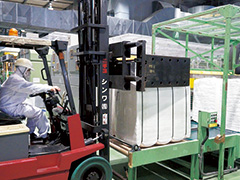
The main raw materials are rayon, polyester and other "staple fibers". It is compressed and packed every 200 to 300 kg and supplied by the fiber manufacturer. Depending on the desired properties, some fibers may be blended.
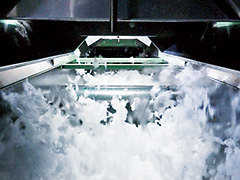
The compressed fiber is loosened and mixed to obtain uniform blending ratio and weight dispersion.
In this way, it becomes a raw material suitable for the next process (carding).
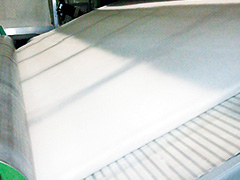
Fibers with uniform blending ratio and weight distribution become sheet-like state by passing through multiple rolls wound with tooth-shaped metal wire in the carding process. This sheet-like state is called "web". Creating a uniform web is the most important point in the carding process, and here too, Shinwa's "technology" is demonstrated.
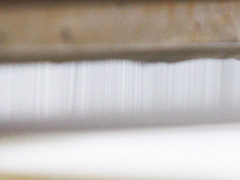
After the carding process, the fibers in the web are not yet bonded. The high-pressure water streams is applied to this web to entangle the fibers, turning it into a strong sheet.
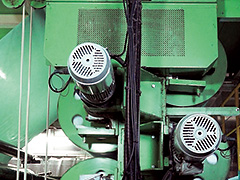
It dries the wet sheet, and performs fusion bonding of the heat-fusion fiber (sheath-core structure).
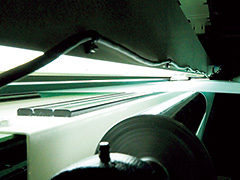
The non-woven fabric after the drying process is strictly checked by the inspection machine for contamination.
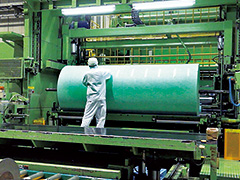
After finishing the inspection process, the sheet can be wound with any width and length.
 A Japanese representative who is teaching local staff. We practice reliable management for quality control
A Japanese representative who is teaching local staff. We practice reliable management for quality control We introduce 5S of rearranging, tidying, cleaning, cleanliness, acupuncture
We introduce 5S of rearranging, tidying, cleaning, cleanliness, acupuncture Air shower when staff enter factory
Air shower when staff enter factory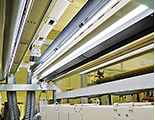 Contamination inspection process in production line
Contamination inspection process in production lineAt PT.SNI, six experienced Shinwa Corp. factory employees have been assigned as representatives, and we are working on manufacturing products with the same quality control system as Japan. In addition to maintenance of each machine, management of temperature and humidity in the factory, positive pressure management, management of workers' clothing and entrance restrictions, and insect control measures are implemented from the viewpoint of management of the entire production line and further maintenance of the factory environment. We also carry out quality control system standards and 5S initiatives.

ISO 9001 (Quality Management System)
This international standard for the purpose of "customer satisfaction" is a system for providing high quality goods and services to customers.
ISO 14001 (Environmental Management System)
This international standard for the purpose of "environmental protection" is a system to prevent adverse effects for people in the area surrounding the company (stakeholders).
In pursuit of the "progress" and "harmony" of the management basics, our goal is to achieve both "customer satisfaction" and "environmental conservation". To that end, all employees are united in their heart, deeply understand the importance of these two goals, and make every effort to achieve them. Providing a stable supply of high quality products to our customers while paying close attention to them is a source of pride and motivation for all of our employees.
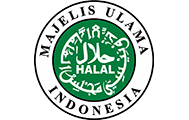
The legal thing in Islamic law is called "halal", and the illegal thing is called "haram". And, in recent years, things that are not halal are sometimes referred to as "non halal".
Indonesia, where we produce nonwovens, has one of the largest Muslim population in the world (estimated in 2016: approximately 225 million). In addition to Malaysia and Brunei, whose national religion is Islam in Southeast Asian countries including Indonesia, there are also Muslims in Thailand and Singapore. In these countries, with economic growth in recent years, along with the expansion of the middle class, there have been a variety of lifestyle changes, and the acquisition of HALAL certification is one of the essential conditions for business construction and development. Based on the HALAL certification, we are working to create products that Muslims can use with confidence.